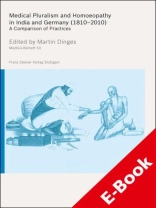Medical Pluralism is by now recognized as a reality in many countries. Studies, however, bringing together anthropologists and historians working on this subject are still rare. A comparative view on Germany and India with their different patterns of institutionalisation of medical pluralism is particularly rewarding. This volume focuses on practices starting with the story of a Transsylvanian lay healer who functioned in Lahore as a cultural broker. Indigenising of homoeopathy in Bengal shows a particular mode of appropriation. Patients and their choices are considered for the late 19th and late 20th century Germany and in present day India. In addition to the practices of lay healers as health care providers in Bengal and in Indian slums, independent General Practitioners and physicians working in the public health care system are analysed too. A case study of an Indian hospital shows a pragmatic way to introduce medical pluralism into a modern ‘allopathic’ institution. The political debate on medical pluralism e.g. in the German Reichstag in the beginning of the 20th century is also one of the topics. The e-book concludes with a theoretical reflection on the concept of medical pluralism.
关于作者
Martin Dinges ist apl. Professor für Neuere Geschichte an der Universität Mannheim und war bis 2019 stellvertretender Leiter des Instituts für Geschichte der Medizin der Robert Bosch Stiftung, Stuttgart. Seine Forschungsschwerpunkte sind Geschlechtergeschichte, Gesundheitsgeschichte der Neuzeit und Geschichte des Medizinischen Pluralismus.












